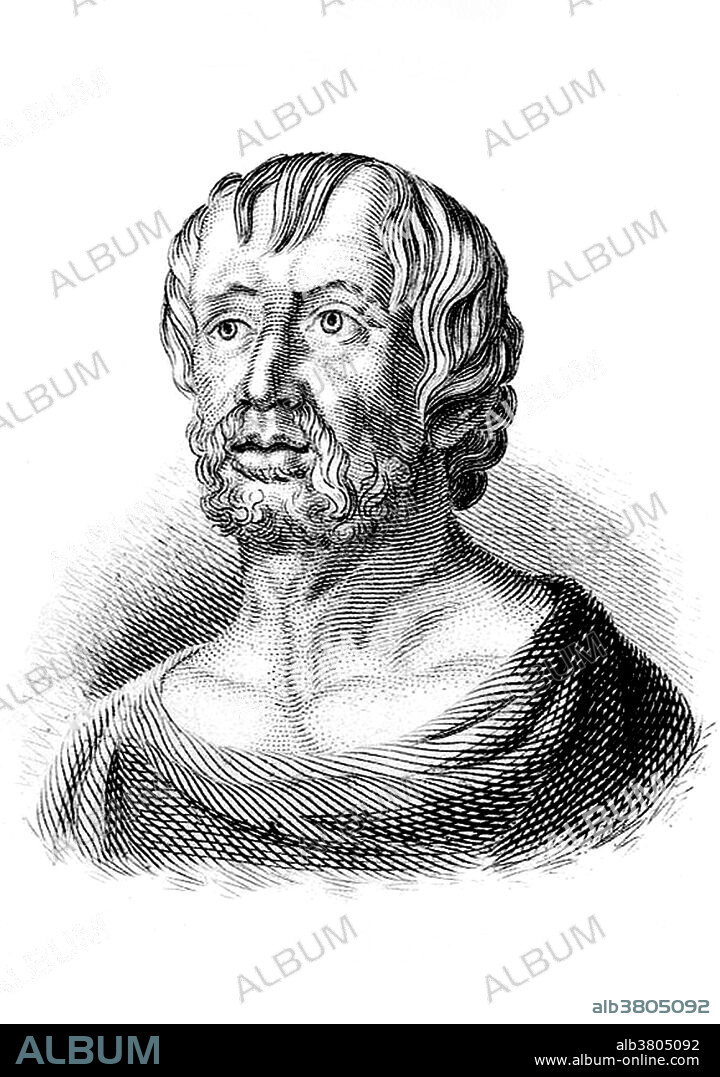alb3805092
Seneca the Younger, Ancient Roman Philosopher

|
Add to another lightbox |
|
Add to another lightbox |



Buy this image.
Select the use:

Title: Seneca the Younger, Ancient Roman Philosopher
Caption: Lucius Annaeus Seneca (4 BC - 65 AD) was a Roman Stoic philosopher, statesman, dramatist of the Silver Age of Latin literature. He was trained in rhetoric and was introduced to Hellenistic Stoic philosophy by Attalus and Sotion. In 41 AD, Claudius succeeded Caligula, and then, at the behest of Claudius' third wife Messalina, the emperor banished Seneca to Corsica on a charge of adultery with Caligula's sister Julia Livilla. In 49 AD, Claudius' fourth wife Agrippina the Younger had Seneca recalled to Rome to tutor her son Nero. Nero became emperor in 54 AD and Seneca acted as Nero's advisor with the praetorian prefect Sextus Afranius Burrus. Over time, they lost their influence over the emperor. In 65 AD, Seneca was caught up in the aftermath of the Pisonian conspiracy, and Nero ordered him to kill himself. Seneca followed tradition by severing several veins in order to bleed to death. His age and diet were blamed for slow loss of blood and extended pain rather than a quick death; he also took poison, which was also not fatal. With a circle of friends attending him in his home, he immersed himself in a warm bath, to speed blood flow and ease his pain and eventually died.
Category: ILLUSTRATION • black & white • Science: Personalities • History: Personalities
Credit: Album / NYPL/Science Source
Releases: ? Model Release: No - ? Property Release: No
Rights questions?
Rights questions?
Image size: 3162 × 4500 px | 40.7 MB
Print size: 26.8 × 38.1 cm | 1244.9 × 1771.7 in (300 dpi)
Keywords: 1ST BCE • 1ST CENTURY B. C. • 1ST CENTURY BC • 1ST CENTURY BCE • 1ST CENTURY • ANCIENT ROMAN • ANCIENT • ANTIQUITY • ART • ARTWORK • BLACK & WHITE • BW • CELEBRITIES • CELEBRITY • CLASSICAL • DRAMATIST • DRAWING • ENGRAVING • FAMOUS PEOPLE • FAMOUS • FIGURE • FORCED SUICIDE • HISTORIC • HISTORICAL • HISTORY • HISTORY: PERSONALITIES • HUMORIST • ILLUSTRATION • ILLUSTRATIONS • ILUSTRATION • IMPORTANT • LITERARY • LITERATURE • LUCIUS ANNAEUS SENECA • MALE • MAN • MEN • NOTABLE • ORDERED SUICICDE • PEOPLE • PERSON • PERSONALITIES • PERSONALITY • PHILOSOPHER • ROMAN • SCIENCE: PERSONALITIES • SENECA THE YOUNGER • SENECA • SILVER AGE OF LATIN LITERATURE • STATESMAN • STOA • STOIC PHILOSOPHER • STOIC • STOICISM • WELL-KNOWN • WESTERN PHILOSOPHY


 Pinterest
Pinterest Twitter
Twitter Facebook
Facebook Copy link
Copy link Email
Email
